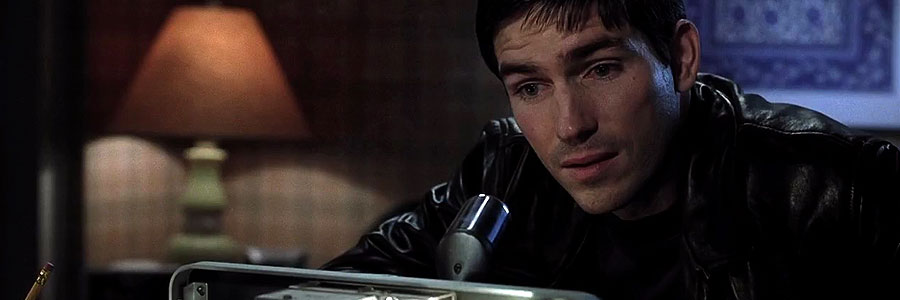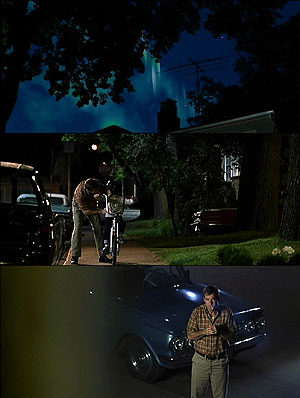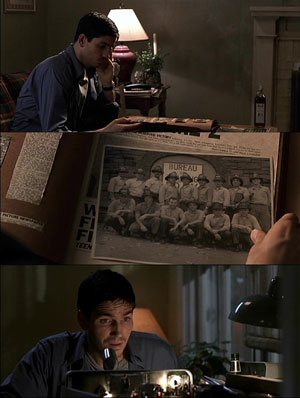
Frequency
New Line Cinema
Original release: April 28th, 2000
Running time: 118 minutes
Director: Gregory Hoblit
Writer: Toby Emmerich
Composer: Michael Kamen
Cast: Dennis Quaid, Jim Caviezel, Elizabeth Mitchell, Noah Emmerich, Brian Greene
Who the hell was that? 00:15:51 to 00:19:41
Deconstructing Cinema: One Scene At A Time, the complete series so far

Time is a mystery. It’s free but it’s priceless. We can use it but we can’t hold it. We can spend it but we can’t keep it and when it’s gone… we’re told we can never get it back.
The mystery of time is something that’s been on my mind for over a decade now, but for the past of weeks there’s nothing I’ve thought of more than how I could turn it back, make some it last longer and erase other parts completely – but would I be creating a whole new future, or destroying it?
My reasons for wanting to change events in the past aren’t altruistic. While there’ve times when I wanted to stop planes from flying into buildings and bombs exploding on trains, recently I’ve been feeling rather selfish. It’s been a week since my father’s funeral and while his death wasn’t unexpected, no one is ever really prepared for losing a loved one.
A boy’s relationship with his father is what some might say is the most important relationship in his life. A father teaches his son to ride his bike and to throw a ball. He’s there to tell him how to shave and gives him the talk on how to impress a girl in his class. He’s there smiling proudly during his achievements and shares a beer with him at graduation. He’s a constantly present figure in the boy’s life; a strong inspiration and everything he is, is what helps the boy become the man he’s going to grow up to be.
The only problem is real life is never so simple. My father didn’t teach me to ride my bike or throw a ball, I never got to borrow his car and he didn’t attend my graduation like he promised. Often he’d be sullen; on his own and deep in thought.

On the day he died I was the last one to visit him. As I sat beside his bed watching his heart rate on the monitor I thought finally the talk would come – that he’d tell me I did for him what my brothers couldn’t. I wanted to hear he was proud that I left home early, that I put myself through university without his help and earned a degree on my own. I wanted to hear all these things and for him to say he was sorry for not helping me when I asked him.
We remained there in silence as I fussed over his breathing apparatus and he fiddled with the finger clip for his heart monitor which kept slipping off. I knew this would be the last time we would have to talk and deep in my heart I wanted to tell him it was ok and that I love him no matter what he felt or didn’t feel for me as a son. Instead I said nothing, too proud to show my feelings in front of him because the one thing he taught me was that feelings are signs of weakness. Despite this, the one thing he shared with me on that day was that he was scared of dying.
Half an hour after I left him he was gone and for the first time in my life I began to experience what loss and regret felt like. It was then I started to look back on the time I had a father and I was seeing him not as the man I struggled to be different from, but as the man I’m so much like. To suddenly hear stories from my mother about songs he used to sing to her, jewellery he bought her and the photograph of her as an 18-year-old she never knew he kept in his wallet, I was realising my father was very much like how I am now. What happened in his life that changed him and made him so distant?
If I could talk to him before whatever happened happened, then maybe I could change the way things worked out. Maybe he’d make different choices, maybe I would… maybe we’d have more time together.
After the funeral, there’s one film I came home and wanted to see more than any other. Frequency, though relatively unknown, was always one of those films I liked to watch because it deals with the idea of changing the present by changing the past.

Set in 1999, its story is centred on John Sullivan (Jim Caviezel), a NYPD Detective who arrives home one night to find his girlfriend is leaving him. Instead of being left alone to mull over his situation, his best friend Gordo (Noah Emmerich) comes over with his son to watch a game and they end up digging out John’s dad’s old ham radio, for old time’s sake.
Frank Sullivan (Dennis Quaid) was FDNY Senior Firefighter who died heroically 30 years ago, but he loved to talk on the radio and the vintage piece of machinery’s remained in a box for years. It’s still in good working condition when they pull it out from under the stairs and later that night – on the eve of the 30th anniversary of Frank’s death – when John’s alone and looking through his father’s old things, he’s watching a television interview with physicist Brian Greene who’s discussing the aurora borealis and string theory.
The aurora borealis, for anyone who’s seen it, is one of the stunning events of your lifetime. They’re brighter these days, is there something going on there? Do they tie in with your field? Where do they come from?
BRIAN GREENE:
They’re a stunning sight, really beautiful to look at. I don’t think we’ve seen any quite this bright for maybe 30 years. But from the point of view from physics and string theory, there’s nothing really that can be gained from studying the aurora borealis. Now, history does teach us that every time we thought we had it figured out there was some major discovery right around the bend that required a complete dramatic change in our understanding of the laws of physics.
DICK CAVETT:
This is a phrase people have begun to hear, string theory.
BRIAN GREENE:
Yes, that’s right. Now string theory dramatically changes our understanding of space and time. For example, it turns out that string theory requires our universe to have 10 or possibly even 11 dimensions. The strange thing is some physicists are even pursuing the idea that there might be more than one time dimension. So in addition to time as we know it, psychological time which seems to organise events in the universe around us there may be a second time dimension where the universe evolves in some different manner.
It’s at this moment something extraordinary happens. Following a loud burst of static John hears a voice on the airwaves and responds to it. The voice on the other side is none other than his father, Frank, who’s sitting in the same spot 30 years previously  and watching an interview with a much younger version of Brian Greene. John doesn’t know it’s his father yet though and the scene is beautifully acted by Quaid and Caviezel as they get to talking about baseball.
and watching an interview with a much younger version of Brian Greene. John doesn’t know it’s his father yet though and the scene is beautifully acted by Quaid and Caviezel as they get to talking about baseball.
Later on in the film father and son realise their connection and John is in the position to change the events in the past which lead to his father’s death, allowing the senior Sullivan to make different choices and live to see his son grow up and become the man he is today.
What I wouldn’t give for such a chance now, to talk to my father when he was my age and say “Dad, listen, you have a family and you’re gonna have to do things differently because mom needs you, and because I need you.” Would he listen to me? Would he believe I was his son from the future? Would I experience the effects of the past being changed instantly, the way John experiences both realities simultaneously when Frank does what John tells him?
These questions and many more rise to the surface when watching Frequency, but perhaps most perplexing of all is this one; “What is time?”
Time, as we might be inclined to say, is the thing which the clock tells us. It’s the passing of light during the course of the day when the sun rises and sets, when darkness falls and another cycle begins again in the morning. Days pass into weeks,  weeks into months, and months in years and so on. Time can also be described as the measure of events that take place; the passing of one moment into another. We sometimes even say “Time is money”.
weeks into months, and months in years and so on. Time can also be described as the measure of events that take place; the passing of one moment into another. We sometimes even say “Time is money”.
These are all ways in which the passing of time is measured but they don’t tell us what time is. St. Augustine, the 4th century philosopher and theologian also asked this question.
What, then, is time? If no one asks me, I know what it is. If I wish to explain it to him who asks me, I do not know. Yet I say with confidence that I know that if nothing passed away, there would be no past time; and if nothing were still coming, there would be no future time; and if there were nothing at all, there would be no present time.
But, then, how is it that there are the two times, past and future, when even the past is now no longer and the future is now not yet? But if the present were always present, and did not pass into past time, it obviously would not be time but eternity. If, then, time present — if it be time — comes into existence only because it passes into time past, how can we say that even this is, since the cause of its being is that it will cease to be? Thus, can we not truly say that time is only as it tends toward non-being?” ¹
There’s great difficulty in explaining what time is – we know what it does, how it’s used and why it’s important to us, but what is it and why does it appear to flow in only one direction thereby making it so hard for us to go back change things?
German philosopher Immanuel Kant described time as an a priori intuition which allowed us to understand sense experience. ² Kant believed that space and time  were rather like parts of a systematic mental framework which organised our experiences into something that could be understood.
were rather like parts of a systematic mental framework which organised our experiences into something that could be understood.
For Kant, space and time were not actually existing substances. This idea allows for us to have time and space as concepts that help in the way of how we perceive things. Thus the way we perceive these things and experience them may not necessarily be how they really are.
In his book The Elegant Universe, Brian Greene seeks to merge Einstein’s general relativity with quantum mechanics to come up with superstring theory, otherwise known as “the theory of everything”. In doing so, he also talks about some of the problems we encounter when we look at time.
He then moves on to discussing how special relativity takes into account that distance and time depend on the observer, and that time and space are perceived differently, depending on the observer. This idea was first put forward by Einstein in 1905 in his article On The Electrodynamics Of Moving Bodies and for the first time it became feasible that our traditional ideas regarding time based on our everyday experiences might actually have some severe flaws and devastating consequences.
- Confessions by Saint Augustine, Confessions (397 AD) ¹
- Immanuel Kant, Critique Of Pure Reason (1781) ²
- Brian Greene The Elegant Universe (1999) ³
While Frequency isn’t about time travelling, it’s more about cross-time communication and how a father and son are able to change events through that. There’s much we still don’t know about time but the one thing I feel certain about is that it’s not as fixed as we tend to think it is. It was Greene’s work back in 2000 which first brought me to the notion that time and space are concepts which are still evolving and which even the best minds on the planet are still grappling with.
If even philosophers and physicists continue to scratch their heads at the conundrum time presents when we start to look at it as a whole or in its individual parts (past, present and future), then those fundamental ideas we cling to, along with the idea that the past can never be changed, might also be flawed.
Perhaps one day I will be able to send a letter back to my father 30 years ago, changing the course of our lives. Perhaps it’s already happened.

Patrick Samuel
The founder of Static Mass Emporium and one of its Editors in Chief is an emerging artist with a philosophy degree, working primarily with pastels and graphite pencils, but he also enjoys experimenting with water colours, acrylics, glass and oil paints.
Being on the autistic spectrum with Asperger’s Syndrome, he is stimulated by bold, contrasting colours, intricate details, multiple textures, and varying shades of light and dark. Patrick's work extends to sound and video, and when not drawing or painting, he can be found working on projects he shares online with his followers.
Patrick returned to drawing and painting after a prolonged break in December 2016 as part of his daily art therapy, and is now making the transition to being a full-time artist. As a spokesperson for autism awareness, he also gives talks and presentations on the benefits of creative therapy.
Static Mass is where he lives his passion for film and writing about it. A fan of film classics, documentaries and science fiction, Patrick prefers films with an impeccable way of storytelling that reflect on the human condition.
© 2022 STATIC MASS EMPORIUM . All Rights Reserved. Powered by METATEMPUS | creative.timeless.personal. | DISCLAIMER, TERMS & CONDITIONS
HOME | ABOUT | CONTACT | TWITTER | GOOGLE+ | FACEBOOK | TUMBLR | YOUTUBE | RSS FEED
CINEMA REVIEWS | BLU-RAY & DVD | THE EMPORIUM | DOCUMENTARIES | WORLD CINEMA | CULT MOVIES | INDIAN CINEMA | EARLY CINEMA
MOVIE CLASSICS | DECONSTRUCTING CINEMA | SOUNDTRACKS | INTERVIEWS | THE DIRECTOR’S CHAIR | JAPANESE CINEMA





